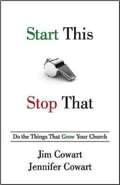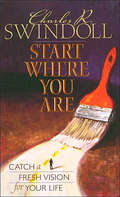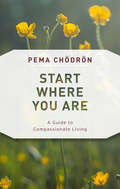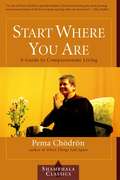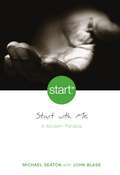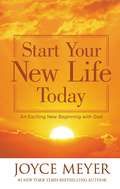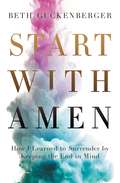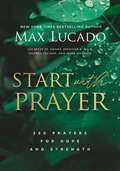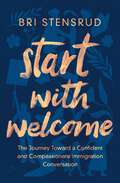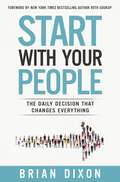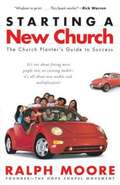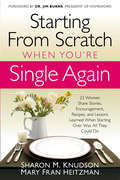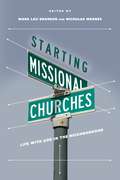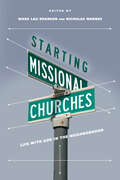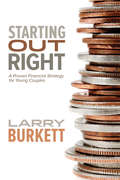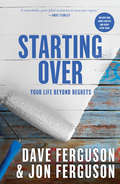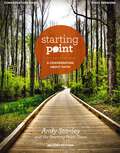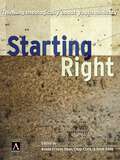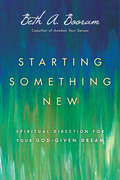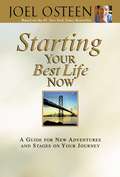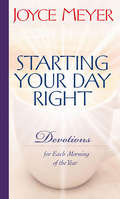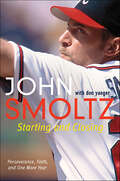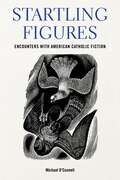- Table View
- List View
Start This, Stop That: Do the Things That Grow Your Church
by Jennifer Cowart Jim CowartWe need less conventional wisdom and more creative leadership.Not all of the advice you’ve heard on church growth works. Judging by results, most doesn’t. It’s time we re-evaluate the standard thinking on how to grow a church, especially considering new voices questioning the worth of church growth.Jim Cowart is shepherding an amazing story. 1800 professions of Christ in ten years have propelled Harvest Church from a church plant of four – Jim’s family – to a thriving community of Jesus disciples. Harvest is changing their world and having a party while they do it. Learn why conventional church thinking such as pastoral care, long-term planning, stewardship campaigns, committees and even staff inhibit church growth. Learn how to do less, and lead more people to Christ.
Start Where You Are
by Charles Swindoll"To start fresh, to start over, to start anything, you have to know where you are," says Charles Swindoll. "Seldom does anybody just happen to end up on a right road." In Start Where You Are, Swindoll offers upbeat and practical advice on creating a life worth living, no matter what the circumstances are now or where they may lead in the future.
Start Where You Are: A Guide to Compassionate Living
by Pema ChodronStart Where You Are is an indispensable handbook for cultivating fearlessness and awakening a compassionate heart. With insight and humor, Pema Chödrön presents down-to-earth guidance on how we can "start where we are"--embracing rather than denying the painful aspects of our lives. Pema Chödrön frames her teachings on compassion around fifty-nine traditional Tibetan Buddhist maxims, or slogans, such as: "Always apply only a joyful state of mind," "Don't seek others' pain as the limbs of your own happiness," and "Always meditate on whatever provokes resentment." Working with these slogans and through the practice of meditation, Start Where You Are shows how we can all develop the courage to work with our inner pain and discover joy, well-being, and confidence.
Start Where You Are: A Guide to Compassionate Living
by Pema ChödrönStart Where You Are is an indispensable handbook for cultivating fearlessness and awakening a compassionate heart. With insight and humor, Pema Chödrön presents down-to-earth guidance on how we can "start where we are"--embracing rather than denying the painful aspects of our lives. Pema Chödrön frames her teachings on compassion around fifty-nine traditional Tibetan Buddhist maxims, or slogans, such as: "Always apply only a joyful state of mind," "Don't seek others' pain as the limbs of your own happiness," and "Always meditate on whatever provokes resentment. " Working with these slogans and through the practice of meditation, Start Where You Are shows how we can all develop the courage to work with our inner pain and discover joy, well-being, and confidence.
Start With Me: A Modern Parable (START)
by John Blase Michael SeatonC2, Zondervan, and World Vision are teaming together on the most ambitious and ecumenical curriculum promoting Christian social responsibility and justice ever conceived. A topic that has been building a great deal of buzz within the ranks of Church leadership, but has not yet ignited as an action based movement among North American Christians. That’s 77 million potential Good Samaritans sitting in the pews. And the time is now. The people are ready. The market is ready for the book, START – becoming a Good Samaritan. START’s headliner curriculum (list attached) brings together topical experts, theologians, mega-church pastors, front-line workers, victims, encouragers, and even “unknowns” to offer a complete picture of the problem and a practical understanding of how to be a Good Samaritan right now, right where each of us lives. We are all too painfully aware that the Church today is not known as Good Samaritans. We’re known more as the Priest or the Levite from the story – or worse. Rick Warren put his finger on the aching need for this curriculum and book when he said, “It’s time for a second reformation, not one of theology, but of works.”
Start Your New Life Today: An Exciting New Beginning with God
by Joyce MeyerJoyce guides readers to making the most important decision they will ever make. Beginning with the decision to accept Christ, Joyce explains the life-changing impact that comes from knowing God in the most personal way possible. She walks readers through what makes everyone unique creations as a tri-part being--spirit, soul, and body--and how God relates to them in all three areas. Joyce demonstrates the importance of each part aligning to serve God fully and helps readers avoid pitfalls that keep them from being their best.Joyce breaks the book into sections covering each of the parts that make up human beings and explains in great detail the various challenges faced in becoming healthy in those areas and how to anticipate and overcome those obstacles. With brief chapters that each cover a clear and concise thought this book is very reader friendly and accessible.Joyce's unique style shines through and delivers her core message of the importance of an intimate relationship with God and the many-fold ways that will change lives.
Start Your New Life Today: An Exciting New Beginning with God
by Joyce MeyerJoyce guides readers towards making the most important decision they will ever make. Beginning with the decision to accept Christ, Joyce explains the life-changing impact that comes from knowing God in the most personal way possible. She walks readers through what makes everyone unique creations as a tri-part being - spirit, soul, and body - and how God relates to them in all three areas. Joyce demonstrates the importance of each part aligning to serve God fully and helps readers avoid pitfalls that keep them from achieving their best.Joyce breaks the book into sections covering each of the parts that make up human beings and explains in great detail the various challenges faced in becoming healthy in those areas and how to anticipate and overcome obstacles.Joyce's unique style shines through and delivers her core message of the importance of an intimate relationship with God.
Start with Amen: How I Learned to Surrender by Keeping the End in Mind
by Beth GuckenbergerOne power-packed word: amen. Millions of Christians all over the world say this word every day. Yet few realize what richness, depth, truth, and connection are packed into this sacred phrase. Throughout the centuries, Christian tradition has taught us to end prayers with amen. But the Bible is full of stories and passages where God’s people started their prayers with amen. Why? As Beth Guckenberger shows, amen is more than just a way to punctuate a conversation with the God of the Universe. Amen is a declaration of who God is and who we are in relation to him. It is a moment of submission and worship, saying “So be it” to a Sovereignty that holds all things, and acknowledging “It is as you say” to him who holds our lives. In Amen, Beth unpacks all the Bible has to teach us about the moment we say amen to God. Using key scripture passages mixed with fresh teaching and personal stories, she invites readers to experience the richness they’ve been missing. Amen is more than just a word. Amen is a full invitation from God packed with all that he requires from us and all he longs to bestow upon us as his beloved children. As Beth writes, “He is beckoning us all. Come to me. Learn my ways. You are my child, whom I dearly love and bought with a price. The God of Amen rescued you so you can echo amen back to him. God intended this word to be a moment of intimacy, drenched in reverence, replete with peace—the moment when you rest in him and are rejuvenated by him. There is so much more he wants to give. Amen.” If Christians long to be truly connected to their Creator, they must begin with amen. For, as Isaiah 65:16 says, “Because he who is blessed in the earth will be blessed by the God of Amen.”
Start with Prayer: 250 Prayers for Hope and Strength
by Max LucadoDo you find it difficult to turn to prayer when you need it most? Do you have trouble finding the words to capture exactly how you&’re feeling? Start with Prayer, by pastor and New York Times bestselling author Max Lucado, will give you the tools you need to feel more comfortable when you communicate with God. When struggles and anxieties come up in our lives, we invite God into our world, watching our fears surface and then depart. But how do we help prayer become a tried-and-true practice in our daily lives? Finding the right words to pray can be challenging, but Max is here to help. Whether you&’re learning to pray for the first time or you&’re hoping to reinvigorate your prayer life, Start with Prayer will change the way you think about your relationship with God. Pairing timeless scripture with thoughtful prayers, Start with Prayer is a special collection of 250 prayers that will help you develop the strength and hope you need to turn to prayer first in any situation you're facing. Adapted from Max&’s series of Pocket Prayers with brand new prayers added, Start with Prayer is divided into categories designed to foster prayers that impact every aspect of life, including prayers centered around: Clarity and creativity Healing and safety Inspiration and encouragement Preservation and endurance Wisdom and leadership Start with Prayer is a trustworthy resource that you can turn to no matter what season of life you&’re in right now, reminding you that starting with prayer is always the right answer.
Start with Welcome: The Journey toward a Confident and Compassionate Immigration Conversation
by Bri StensrudAsking the hard questions about immigration in light of Jesus' call to love our neighbors as ourselves.You've seen the headlines. You've watched the TV footage. People around the world are in dire situations and on the move. Current estimates suggest over 100 million people are forcibly displaced from their homes and seeking refuge in other countries. It seems as if everyone wants to come to the U.S., and if we're honest, that gives many of us pause.We wonder how it would impact our culture and communities if we showed welcome to the world, and many of us wonder how to separate the political rhetoric and talking points on present day immigration from what the Bible really has to say about immigrants and strangers.Start with Welcome dives into the whole narrative of Scripture to better understand what God calls us to do concerning immigrants and refugees. Bri Stensrud will guide you through pressing questions that will ignite your compassion and leave you curious about our calling as followers of Christ—questions like:Is Immigration a Pro-Life Issue?What does the Bible say about Immigrants?Who is Welcome here?What does Christlike Welcome look like? You have questions. You have fears. But you also have compassion.So, let's start there.Bri Stensrud welcomes you into the conversation—a conversation that&’s more urgent now than ever. It all starts with one word: Welcome.
Start with Your People: The Daily Decision that Changes Everything
by Brian DixonFor all who want to build a life that abounds with connection, friendship, purpose, and meaningful success, Brian Dixon presents a simple yet profound mantra: Start with Your People. It can be easy to become task-oriented, focusing on the goals ahead of us and checking off our to-do lists rather than focusing on the people in our lives. Entrepreneur and business coach Brian Dixon knows firsthand, and after one too many burned bridges and failed projects, he set out to discover the secret to living a life that matters and finding work you love.In Start with Your People, Brian shares principles, tips, and personal stories to help you maximize the most important resource to succeed in both life and calling: relationships. Join Brian on a journey to discover the people-first mindset that changes everything, including:Why your family actually helps you succeed, and how to see your kids as a legacy instead of a liabilityThe fastest, safest way to deal with the difficult people in your lifeA 10-step method to create your own personal mission statementThe #1 key to unlocking a powerful networkPlus, you get 11 powerful mindset hacks including Brian's life-changing morning practicePerfect for anyone looking to better live their purpose--whether a business executive, employee, stay-at-home mom, college graduate, entrepreneur, pastor, etc.--and lean into your home team as you move forward with clarity and confidence.Brian says, "When we really get down to it, our main legacy will be the investment we made in people."What's yours?
Starting A New Church
by Ralph Moore<P>According to the author perhaps our greatest responsibility is to evangelize our own generation. Yet established churches are not able to do that. In fact, rising generations of Americans live in ignorance of Jesus Christ and have no moral absolutes. Aggressive church planting, the author believes, is the answer to the problem, because new churches focus on the needs of each new generation and present biblical truth in the cultural context that best reaches those people. <P>The objectives of this book are to lay down the challenge to consider becoming a church planter while at the same time screen out wishful thinking and focus on the practical challenges of church planting. This authoritative and edgy message is the next thing in evangelism.
Starting From Scratch When You're Single Again: 23 Women Share Stories, Encouragement, Recipes, and Lessons Learned When Starting Over Was All They Could Do
by Sharon M Knudson Mary Fran HeitzmanYou're suddenly single again. What do you do now? Where do you turn? Starting From Scratch When You're Single Again serves up poignant stories from twenty-three widowed or divorced women who survived a horrific deathblow to their dreams for a happy, secure future. Somehow, with white-knuckle faith, each one found enough strength in themselves and in their God to move forward. Let each woman's story and the guiding principles she offers be an encouragement to you, and as a bonus, let the taste and aroma of her favorite recipe comfort and nourish your soul.
Starting Missional Churches: Life with God in the Neighborhood
by Mark Lau Branson Nicholas WarnesAll mission is local--the people of God joining the work of God in a particular place. In Starting Missional Churches Mark Lau Branson and Nicholas Warnes introduce us to seven missional churches while examining common challenges regarding their genesis. Using stories, interviews with pastors and a look at common preconceived notions of church planting in the West, this guide brings together resources of the missional church conversation with the creativity and energy of those who are experimenting with diverse planting activities and practices across the country. Curated by a pastor and a professor, this work highlights diverse modern examples of congregations focused on reaching their communities with a missional mindset. Learn from these stories how to build a vibrant, engaging church--one that generates redemptive witness in our neighborhoods and in our world.
Starting Missional Churches: Life with God in the Neighborhood
by Mark Lau BransonAll mission is local?the people of God joining the work of God in a particular place. In Starting Missional Churches Mark Lau Branson and Nicholas Warnes introduce us to seven missional churches while examining common challenges regarding their genesis. Using stories, interviews with pastors and a look at common preconceived notions of church planting in the West, this guide brings together resources of the missional church conversation with the creativity and energy of those who are experimenting with diverse planting activities and practices across the country. Curated by a pastor and a professor, this work highlights diverse modern examples of congregations focused on reaching their communities with a missional mindset. Learn from these stories how to build a vibrant, engaging church—one that generates redemptive witness in our neighborhoods and in our world.
Starting Out Right
by Larry BurkettIf you and your spouse are newly married, you probably have a lot of questions about how to make, spend, and invest money. Financial expert Larry Burkett can help you avoid the financial pitfalls many young couples encounter. In this highly practical guide, he helps you: * Understand how God uses money in a marriage, * Make wise choices about credit cards, * Design a budget that you both like, * Stop bad habits before they start, * Teach your children about finances, and * Decide what type of investments are right for you ... and much more.Starting Out Right offers solid biblical direction and time-tested advice to help you make wise financial choices that will last a lifetime.
Starting Over in Texas (Red Dog Ranch #4)
by Jessica KellerThe biggest risk is to their hearts…He’s finally home. She’s always wanted a home.Can they find what they need together?Returning to his family ranch is the fresh start widower Boone Jarrett and his daughter need. What he doesn’t need is rodeo rider Violet Byrd teaching Hailey to ride horses—it’s too dangerous. And with Violet working at the ranch, she’s challenging his every decision. Yet Boone can’t stop his growing feelings. Could a second chance at love be worth the risk?
Starting Over: Your Life Beyond Regrets
by Dave Ferguson Jon FergusonI wish I had loved more.... I wish I had been smarter about money.... I wish I had thought about God more.... We all have regrets about the past. Many of them come from our attempts to fulfill unmet longings. Dave and Jon Ferguson call this back and forth between longing and regret the Sorry Cycle--and they want to help us escape it. In Starting Over, Dave and Jon show us how to recognize specific regrets and then release them to God as we learn to see our regrets as opportunities to start over. Finally, we can see God redeem our regrets as he takes the worst things in our lives and uses them for a greater good. Your regrets don't need to keep you from the joy God has for your life. As you apply the recognize-release-redeem process to your financial, relational, and personal regrets, you will find new freedom in living out your God-given dreams.Fall in Love with Your Regrets It sounds impossible. How can we learn to love our mistakes? Instead, we go over and over them in our mind. Could they ever bring us--or anyone else--good? Drawing from scientific research and biblical truths, Jon and Dave Ferguson give us tools to redeem our mistakes in five key areas: relationships, health, purpose, finances, and spirituality. Along the way, they teach us lifelong skills for getting unstuck when regret threatens to trap us again. We also learn how to help others escape the Sorry Cycle and experience the Starting Over Loop. It is possible to learn to love our regrets because through them we see God at work. We see that our weakness does not limit what God can do. Whatever regret is trapping you in the Sorry Cycle, God is big enough to redeem it. What could you do with a life beyond regret?From the Hardcover edition.
Starting Point Conversation Guide Revised Edition: A Conversation About Faith
by ZondervanEverything has a starting point—your life, your relationships, your education, your career. Sometimes we forget that faith has a starting point as well. For some of us, our faith journeys began in childhood as a set of beliefs handed to us by a parent, teacher, or pastor. Maybe you developed a framework of faith based on personal experience. Or maybe you had no faith at all. Too often, a faith formed in childhood isn’t strong enough to withstand the pressures of adult life. But what if you could find a new starting point for faith? Welcome to Starting Point – an 8-session small group conversation about faith. Whether you’re new to faith, curious about God, or coming back to church after some time away, it’s a place where your opinions and beliefs are valued, and no question is off limits. During the eight sessions, you will: Use this Starting Point Conversation Guide to reflect on central questions of faith and life. Watch the video component each week in preparation or as part of the discussion. Explore and share what you’re learning with other people in a conversational environment. Come as you are and build relationships with others as you discover your starting point. SESSIONS INCLUDE: Start Problem Trust Rules Jesus Grace Faith Invitation Andy Stanley is the founder of North Point Ministries, Inc. (NPM). Each Sunday, more than 36,000 people attend one of NPM’s six Atlanta-area churches. To learn more and to access free online resources, visit www.northpointministries.org.
Starting Right: Thinking Theologically About Youth Ministry (YS Academic)
by Kenda Creasy Dean Dave Rahn Chap ClarkStarting Right: Thinking Theologically About Youth Ministry is the first academic textbook that introduces youth ministry students (whether undergraduate or graduate level) to a marriage of solid research, real life, and accessible design. Whereas most college-level texts may reflect a thorough (though impenetrable) mastery of the field, they tend to expect readers to plow through unnecessarily thick prose and bland design because “it’s good for them.” Youth Specialties doesn’t agree. In this debut title to a continuing academic book line, college and seminary students will be introduced to real-life research, real-life youth ministry dilemmas, and real-life solutions. Contributing writers represent a spectrum of Christian Education thought and practice, as well as widespread recognition in their field…transdenominational, yet the perfect background to ministry in any denomination or ministry organization This text includes thorough indexes, design, and graphics that compel readers from page to page (now that’s a first for a college text!); organization that permits professors to use any part of the text, in any order, rather than plod through the entire book from beginning to end; a perfect primary text that gives students a rich, academic, and readable (though not “popular”) grasp of every aspect of youth ministry a typical Intro course touches, while also serving as an ideal secondary text.
Starting Your Best Life Now: A Guide for New Adventures and Stages on Your Journey
by Joel Osteen#1 NEW YORK TIMES bestselling author Joel Osteen uses his seven successful principles from YOUR BEST LIFE NOW to give readers an edge on new beginnings and to make their faith count most in important moments.
Starting Your Day Right: Devotions for Each Morning of the Year
by Joyce MeyerBestselling author and speaker Joyce Meyer offers this pocket-sized devotional to help readers seek God in the morning-and keep Him close all day long. Most Christians agree that when believers start the day off by seeking God, it gives thema positive outlook and a sense of peace that leads to a better day-and ultimately a better life. Now, Joyce Meyer provides readers with a day-by-day guide for getting closer to God every morning of the year. Topics in this 365-day devotional include the keys to enjoying every single day, balancing out extremes, acting with discipline and self-control, being happy, living without fear, and much more. Readers will be inspired each morning with a resurgence of hope and resilience in life through these brief and inspirational thoughts, and will never again want to leave home without first seeking the Lord.
Starting and Closing: Perseverance, Faith, and One More Year
by Don Yaeger John SmoltzJohn Smoltz was one of the greatest Major League pitchers of the late twentieth / early twenty-first century—one of only two in baseball history ever to achieve twenty wins and fifty saves in single seasons—and now he shares the candid, no-holds-barred story of his life, his career, and the game he loves in Starting and Closing.A Cy Young Award-winner, future Baseball Hall of Famer, and currently a broadcaster for his former team, the Atlanta Braves, Smoltz delivers a powerful memoir with the kind of fascinating insight into game that made Moneyball a runaway bestseller, plus a heartfelt and truly inspiring faith and religious conviction, similar to what illuminates each page of Tim Tebow’s smash hit memoir, Through My Eyes.
Startling Figures: Encounters with American Catholic Fiction (Studies in the Catholic Imagination: The Flannery O'Connor Trust Series)
by Michael O'ConnellStartling Figures is about Catholic fiction in a secular age and the rhetorical strategies Catholic writers employ to reach a skeptical, indifferent, or even hostile audience. Although characters in contemporary Catholic fiction frequently struggle with doubt and fear, these works retain a belief in the possibility for transcendent meaning and value beyond the limits of the purely secular. Individual chapters include close readings of some of the best works of contemporary American Catholic fiction, which shed light on the narrative techniques that Catholic writers use to point their characters, and their readers, beyond the horizon of secularity and toward an idea of transcendence while also making connections between the widely acknowledged twentieth-century masters of the form and their twenty-first-century counterparts.This book is focused both on the aspects of craft that Catholic writers employ to shape the reader’s experience of the story and on the effect the story has on the reader. One recurring theme that is central to both is how often Catholic writers use narrative violence and other, similar disorienting techniques in order to unsettle the reader. These moments can leave both characters within the stories and the readers themselves shaken and unmoored, and this, O’Connell argues, is often a first step toward the recognition, and even possibly the acceptance, of grace. Individual chapters look at these themes in the works of Flannery O’Connor, J. F. Powers, Walker Percy, Tim Gautreaux, Alice McDermott, George Saunders, and Phil Klay and Kirstin Valdez Quade.
